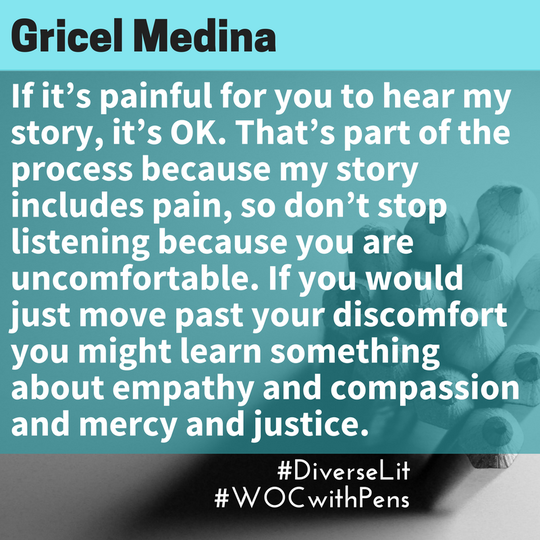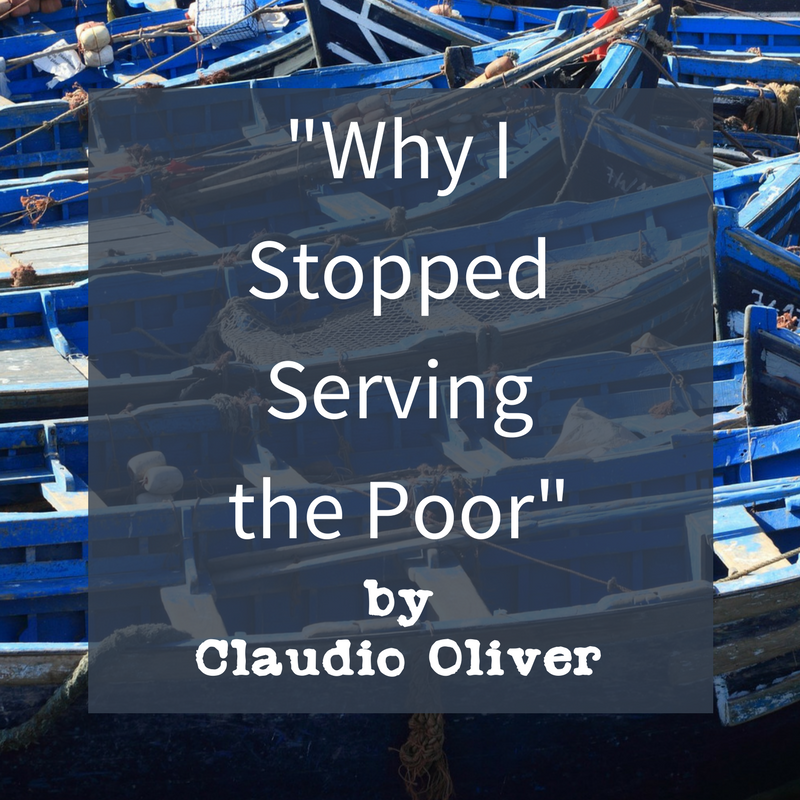|
On Immigration and the Church
Immigration is certainly not political for Gricel. It’s personal. Gricel is from New York City. “All of my family all the way back as much as I can trace is Puerto Rican. My parents and grandparents migrated to the U.S. wanting a better life. Times were tough and poverty was rampant, and the hurricanes—actually very similar to the situation that is happening right now. The plan was always to go back, but my mother and father never got to. They are both buried in Puerto Rico. That was their desire.” “Immigration is personally tied to my story and so is colorism. It’s extremely personal to me. In our family we have different shades. My mother was blonde, white, and had green eyes. My father was very dark skinned and had course hair. So even though they were both Puerto Rican, there was racism because of their skin color.” This is why she—an ordained pastor in the Evangelical Covenant Church—fights for racial egalitarian justice. On Racial Egalitarian Justice “When I say racial egalitarian, I’m purposely putting race in there because we don’t put those in the same context. What has happened over centuries is that Western Christianity is very patriarchal, very white; and when feminism came in there was a stigma that it was a white movement. It was for white women. All of the marches were organized with white women, by white women, for white women. So Latinas often felt marginalized once again, but now by the feminist movement. ‘Mujerista’ or ‘Latina’ theology … African Americans use ‘womanist’ or liberation theology because they could never identify with feminism … they were not at the same economic level as white Americans, or at the same education level like white America. Even though many of us women of color have overcome in areas of education in the 21st century, there is still inequality with the pay, the positions, the authority, and the power. What should have been something for all women became more of an exclusive movement for the ‘right’ women. In this case the ‘right’ woman was the white woman. And it’s bled into every other area,” she said. “There’s the importance of reframing our narrative and an urgency to do it sooner than later. We need to create spaces where we can have these types of conversations. These are the conversations that I’m longing for,” she said. “Egalitarianism … I didn’t know what that meant in an immigrant church. I knew about equality, I knew about feminism. I knew I wanted my relationships to be equal. I knew that, but I didn’t have the hundred-dollar word ‘egalitarian.’ “When I went to research the term, it felt to me—as a Latina—to be exclusive of my story because it didn’t talk about culture. And you cannot authentically reach people of color about egalitarianism without talking about culture,” she said. “We easily target the things that are irrelevant in Western America and therefore we miss the reality of the authentic story. We don’t take time to listen attentively to the story. The important thing is that stories need to be told, and they should be told by the person who has lived the story. I don’t want you to eliminate my voice in my story,” she said. “The narrative of culture has been absent in egalitarian spaces. They have not done their homework and not seen how important it is to integrate the language of culture and ethnicity in the movement of egalitarianism. Silence is consent, no matter how you slice it. When you don’t talk about it, stereotypes grow in power. Self awareness is so important,” she said. On Language and Dialogue Gricel has ideas on how the church can combat this. “The first thing we have to really learn is that language is powerful. Words are powerful. Words can be inclusive, and words can be exclusive. So when we do things with women and equal rights, we have to be careful that our words are not creating more of a gap in the existing marginalization of women of color,” Gricel said. “Because we don’t see things like you. We don’t have the same experience, and so it becomes a chess game so to speak. We always feel like women of color are always going to get checkmate because we go into these arenas from a deficit from the beginning.” She said that the church needs to be aware that their words, including the wording they use on materials, the platforms, and the visuals which so often exclude the people who look differently than the dominant culture. Conferences often become an experience of pain. “What should be an experience of celebration becomes an experience of pain,” she said. “The [visuals of conferences] tell us another story. We have a lot of work to do. When you go to these conferences especially as a person of color it’s just a harsh reality that much is still the same.” “We can’t continue to talk about the dialogue: ‘Oh everything is great and there is no racism,’” she said. “That in itself brings pain; and racism brings marginalization and seclusion and isolation. It devalues us as human beings. The reality is people of color often aren’t represented; we don’t see us up there. It’s perpetuating a culture of silence because we choose not to talk about it. We’ve never really had this conversation and continued it to its conclusion. We start it, then we zip it, and then we go ‘OK’ and walk on. There’s not a completeness to our conversations on racism. There’s not a complete circle where you go deeper and deeper. We always stay on the outer perimeter of racism, and we always stay on the outer perimeter of egalitarianism. Even when we do have these conversations, they are primarily white and academia theorizing about people when many of them have not been in the trenches and haven’t been on the mission field. People who speak from head knowledge,” she said. On Listening “We need to listen,” Gricel said. “Because we aren’t listening, we are just screaming or talking over each other. We need to stop the incendiary language. We need to have dialogues, conversations, and if it’s painful for you to hear my story, it’s OK. That’s part of the process because my story includes pain, so don’t stop listening because you are uncomfortable with my pain. If you would just move past your discomfort you might learn something about empathy and compassion and mercy and justice … if you just stop thinking about yourself and listen to the stories of others. It’s not about me when I’m listening to someone’s story, it’s about that person. As I listen to that story, I learn from the story. And we aren’t listening to the story. It’s like we are interrupting between the story. When people say things like, ‘If America is so bad why don’t you just go back from where you came from,’—those types of things shut down conversations,” she said. “The biggest accomplishment would be to stop thinking about ourselves when someone else is telling their story.” “For all of us in justice and missions and on the front lines and in the trenches, we really need to probe language and pay attention to how we tell the stories. Because the mission field is right here. I learn by listening to the stories of those around me. As I listen to their stories, I respect them. Listening is respecting. Listening to someone from another culture, engaging with them, and entering into their pain is a sign of respect and honor. We have lost the importance of honoring. We have lost our ability to honor someone who is different from us,” she said. “God, in his plan, made us to be a mosaic of different stories, of different colors, of different perspectives and vantage points,” she said. “In order for us to do missions in the 21st century—missions is now in our back yard—we do missions by listening, by engaging, by honoring and respecting the stories people share.” On Conferences and Church “In everything that we do, a writing conference, women’s conference, men’s conference, pastors’ conference or missions conference, we have to think in color. Everything from the beginning to the end of the planning stages has to be done with color in mind because if not when a person of color comes into the conference they are going to see white. Sterile,” she said. “Those types of atmospheres were never designed for us, they are not for us to camp in, they aren’t meant to comfort us. They aren’t nurturing places. We have made the church that way.” “If you have made your church a hospital, not a lot of people want to come in. I don’t know of anyone who really enjoys being in a hospital, but people respond favorably to places where they receive proper care. Churches and any Christian conference needs to be a healing place, a place of comfort, of safety—another issue for people of color, many do not feel safe in Western Christianity. This translates into the mission field. Jesus said go into all the world, learn about who they are, what’s their experiences. Paul knew about Corinth and the Ephesians. He learned about their cultures and their idols so that he could speak to that. He was coming against the things that were culturally erroneous there. ‘Let me tell you about the unknown God.’ He went into that world and he related to them.” “We have taken culture out, and culture is one of the most important tools to reach people with the gospel. Food is part of culture, music is part of culture, the arts. I know many creative people who are just artistic, extremely gifted, and when I talk to them about God, I first talk to them about their paintings and I can see that the gift comes from God. As I look at what they are painting, I can tell they have painted from pain, or joy, or a difficulty, and I ask them to tell me their story. That’s the way that I can come in. People will open their doors to you if you respect and honor them, when you love them unconditionally, and when you don’t have a hidden agenda,” she said. Advice for a Young Immigrant Christian Woman “Stop trying to be someone else. Be yourself,” she said. “People in the 21st century are tired of the plastic, of people talking about vulnerability, but not practicing it. That is key to women today because we are promoting perfectionism, and perfectionism is counterproductive. The only perfect one is God,” she said. “The stories of people are not pretty, but yet the church says just tell us the pretty stories. Do you see the oxymoron there? The church tells women to tell the pretty stories, because when you tell us the ugly stories you make us feel uncomfortable,” she said. “But you don’t have any way or any right to rewrite my history so that you can be comfortable.” “Crying is not pretty. We need to let people cry. And no, it’s not going to be pretty, but it’ll be healing, and it’ll be restoring. We’re teaching our young women that you have to be strong and fierce all the time. And I believe in strong and fierce, I am strong & fierce, but not all the time. There are times I need a shoulder … I need to be able to release the suffering and the pain and the things that I can’t change,” she said. “I have three women that have stage 4 cancer, it’s not pretty. I don’t have an answer for them. All I can do is walk with them and hear their story.” “Crying is not pretty, life is not pretty, ministry is not pretty, and as a woman pastor it infuriates me when people like Piper say ‘Go home and shut your mouth.’ Who are they to pretend to know about my story and my calling? Do you really think that I would pick this? I have better things that I would have loved to do: paid me more money, I’d be in a bigger house, nicer clothes, get me some Jimmy Choo shoes—get out of here. What women would choose to be pastors? This is the hardest most difficult thing I have done in my entire life. There are times I wake up and I don’t want to do this. ‘God I am really mad at you that you chose this.’ People are nasty and ugly,” she said. She said that she was told at a conference that she would be allowed to speak but she was not allowed to step up to the pulpit and speak from there. She fought against it. “I’m not speaking from down here. Those days are over,” she said. “It’s hard. But when a 15-year-old Latina is in the audience because her mother came and brought her, and she comes up to me and says, ‘I have been praying because I want to preach the gospel and I didn’t see any woman that looks like me doing it, and today I saw you.’ It’s not about me, it’s about God using me,” Gricel said. “We need the visuals. It saddens me when I go to these conferences when its monochromatic because of all those women who are asking themselves, ‘Can I do that? Can I preach the gospel? Can I go to seminary? Can I lay my hands on someone? Can I pray in a public setting? Can I write a book? And they see someone who looks like them, that talks like them, and they say ‘Yes, God that’s my confirmation.’ For those young girls out there, and those seminarians that are thinking of quitting seminary. … God is listening and yes, it is hard, and sometimes they wonder if they can make it another week. So for all those POC let’s show them visuals. That’s what we are here for. That’s what we are here for,” she said. Follow Gricel on twitter @pastorGricel
0 Comments
Leave a Reply. |
Gena's
|


 RSS Feed
RSS Feed

